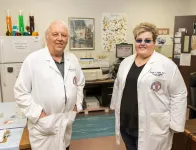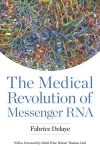(Press-News.org) Polygenic risk scores, which estimate a person’s disease risk based on thousands or millions of common genetic variants, perform poorly in screening and prediction of common diseases such as heart disease, according to a new study led by UCL (University College London) researchers.
It has been claimed that polygenic risk scores will transform the prediction and prevention of common diseases. Companies have already been established that sell polygenic risk score testing services. Polygenic risk score testing is also one of the aims of the nationwide Our Future Health project*.
The new study, published in BMJ Medicine, looked at 926 polygenic risk scores for 310 diseases. It found that, on average, only 11% of individuals who develop disease are identified, while at the same time 5% of people who do not develop the disease test positive. Unaffected people usually outnumber those affected which results in far more false than true positive predictions.
Lead author Professor Aroon Hingorani (UCL Institute of Cardiovascular Science) said: “Strong claims have been made about the potential of polygenic risk scores in medicine, but our study shows that this is not justified.
“We found that, when held to the same standards as employed for other tests in medicine, polygenic risk scores performed poorly for prediction and screening across a range of common diseases.”
For the new study, researchers looked at data available in an open-access database, the Polygenic Score Catalog, to determine what the detection rate and false positive rate of the scores would be if used in screening.
For breast cancer and coronary artery disease, the risk scores identified only 10% and 12% of eventual cases respectively, using a cut-off that resulted in 5% of unaffected individuals testing positive.
The researchers also investigated how polygenic risk scores would perform if used alongside conventional screening methods.
They found that, if used alongside conventional risk factors, several thousand people would need to have a polygenic risk score done to guide statin prescriptions to prevent one additional heart attack or stroke. The researchers noted that using age alone as a guide to statin prescription would be simpler and more effective at preventing heart attacks and strokes without the need for genetic testing.
They also found that adding polygenic risk scores as first stage screening to determine who should be prioritised for mammography would miss most women who later develop breast cancer and generate many false positives, adding to the burden on healthcare systems.
Co-author Professor Sir Nicholas Wald (UCL Institute of Health Informatics) said: “It has been suggested that polygenic risk scores could be introduced early on to help prevent breast cancer and heart disease but, in the examples we looked at, we found that the scores contributed little, if any, health benefit while adding cost and complexity.”
In the paper, the researchers suggest regulation of commercial genetic tests based on polygenic risk scores to “protect the public from unrealistic expectations and already stretched public health systems from becoming overburdened by the management of false positive results”.
The researchers said consumers of commercial polygenic risk score tests should be informed of the detection rate and false positive rate of the polygenic risk scores as well as the absolute risk with and without a polygenic score result so they can better judge whether the test is useful.
Co-author Dr Jasmine Gratton (UCL Institute of Cardiovascular Science) said: “Polygenic risk scores seem attractive because genotyping is now inexpensive, the same for all diseases and is performed only once because a person’s genotype does not change. However, these features are irrelevant if the test is not useful.”
Professor Sir Nick Wald said: “Our results build on evidence that indicates that polygenic risk scores do not have a role in public health screening programmes.”
The researchers said the performance of polygenic risk scores was unlikely to change much as the variants with the strongest effect had already been identified.
Polygenic risk scores should not be confused with genetic testing for certain single gene mutations such as BRCA1 and BRCA2 which have an important role in screening for breast and ovarian cancer.
Discovering variants that are associated with a higher risk of disease is still crucial for drug development, the team emphasised, as the variants encode proteins that can be targeted with drugs that would be useful for everyone regardless of their genetic makeup.
The study was supported by the British Heart Foundation, UK Research and Innovation (UKRI), National Institute for Health and Care Research (NIHR), and the NIHR Biomedical Research Centre at UCLH and UCL.
* https://ourfuturehealth.org.uk/
END
Genetic risk scores not useful in predicting disease
Polygenic risk scores, which estimate a person’s disease risk based on thousands or millions of common genetic variants, perform poorly in screening and prediction of common diseases such as heart disease, according to a new study led by UCL researchers
2023-10-18
ELSE PRESS RELEASES FROM THIS DATE:
Marine mammal longevity study reveals remarkable advances in animal welfare
2023-10-18
A new study provides compelling evidence that animal care and management practices at zoos and aquariums have significantly improved over time. The study, led by Species360 and University of Southern Denmark Research Scientist Dr. Morgane Tidière in collaboration with 41 co-authors from academic, governmental, and zoological institutions around the world, is the first to examine life expectancy and lifespan equality together as a proxy of population welfare in marine mammal species.
The study also found that marine mammal species live longer ...
New specimen collection system enhances assisted reproductive technologies
2023-10-18
New Specimen Collection System Enhances Assisted Reproductive Technologies
Considered an experimental procedure during the late 1970s when it made headlines with each birth it produced, in vitro fertilization (IVF) has helped many couples overcome infertility issues for more than four decades. In several nations, IVF is responsible for up to 3% of the babies born.
The procedure, now a cornerstone of infertility treatments, has expanded to include other assisted reproductive technologies (ARTs). One of those ARTs, known as intracytoplasmic sperm injection (ICSI), involves using a microscopic needle to inject a single sperm into an egg.
Though ...
Ludwig Cancer Research launches leadership fellows program
2023-10-17
OCTOBER 17, 2023, NEW YORK – It is with great pleasure that Ludwig Cancer Research announces its launch of the Ludwig Leadership Fellows Program.
Conceived, funded and managed by the Ludwig Institute for Cancer Research, the Program aims to accelerate the careers of exceptional young scientists by helping them establish genuinely independent programs of research immediately after the completion of their graduate studies.
“Our hope is that the Leadership Fellows program will contribute to a pipeline of outstanding future leaders of cancer research,” said Chi Van Dang, scientific director of the Ludwig Institute. “We and many others have grown increasingly alarmed ...
Paul “Bear” Bryant Awards announce 2023 college football coaches watch list
2023-10-17
HOUSTON, October 17, 2023 – Twenty-six active college football coaches make up the American Heart Association’s 2023 Paul “Bear” Bryant Coach of the Year Award watch list, a list of current coaches in consideration for the annual top honor. The award is given each January to a college football coach for contributions that make the sport better for athletes and fans alike by demonstrating grit, integrity and a winning approach to coaching and life - both on and off the field.
The ...
Lung, kidney, and neuroendocrine tumor cancer studies led by Dana-Farber presented at ESMO Congress 2023
2023-10-17
BOSTON – Novel treatments, combination therapies, and personalized medicine headline several studies led by Dana-Farber Cancer Institute and presented for the first time at the European Society of Medical Oncology (ESMO) Congress 2023 in Madrid, Spain. The studies will be presented both in-person and online on October 20-24, 2023. A full list of Dana-Farber oral abstracts is available here.
A pivotal lung cancer study (LBA65) led by Pasi Jänne, MD, PhD, director of the Lowe Center for Thoracic Oncology, looking at the efficacy and safety of adagrasib with pembrolizumab in patients that have advanced non-small cell lung ...
Last chance: Register in advance for media credentials to cover American College of Surgeons Clinical Congress 2023
2023-10-17
CHICAGO (October 17, 2023): Members of the media can still apply to cover the American College of Surgeons (ACS) Clinical Congress 2023. One of the largest international meetings of surgeons in the world, Clinical Congress will feature many opportunities to report on groundbreaking surgical research, connect with surgeon experts, and learn more about the latest trends in surgery.
When: October 22-25, 2023
Where: Boston, Massachusetts. This year’s conference will once again be a hybrid event (held onsite and virtually).
Apply: Please read the ACS Criteria for Media Credentials before submitting your application for credentials. Apply ...
Mimicking a bird’s sticky spit to create cellulose gels
2023-10-17
Using a small bird’s nest-making process as a model, researchers from North Carolina State University have developed a nontoxic process for making cellulose gels. The freeze-thaw process is simple, cost-effective, and can create cellulose gels that are useful in a number of applications, including tunable gels for timed drug delivery. The process also works with bamboo and potentially other lignin-containing plant fibers.
Cellulose is a wonderful material for making hydrogels – which are used in applications ranging from contact lenses to wound care and drug delivery. But creating hydrogels from cellulose is tricky, and often the processes used to create the hydrogels ...
Familiarity breeds contempt for moral failings
2023-10-17
CORNELL UNIVERSITY MEDIA RELATIONS OFFICE
FOR RELEASE: October 17, 2023
Abby Shroba Kozlowski
cell: 607-229-2681
ars454@cornell.edu
Familiarity breeds contempt for moral failings
ITHACA, N.Y. – People judge members of their own circles more harshly than they judge individuals from other groups for the same transgressions, according to new Cornell University research.
Morality plays a central role in this phenomenon. The researchers found that because morality is a social glue that holds a community together, when someone breaks those moral rules inside the group, it is perceived as more of a threat than when outsiders breaks the same rules in their own groups.
“When ...
The biggest barrier to getting fossil fuel workers green jobs isn’t skills — it’s location
2023-10-17
Between the Inflation Reduction Act and the EU’s Just Transition Mechanism, both the United States and Europe are poised to put tens of billions of dollars toward creating green jobs. At the same time, there are conversations about how to ensure workers in the current fossil fuel industry have the skills to participate in this green revolution.
But new research published in Nature Communications shows many fossil fuel workers have the right skills already — the problem is that those new green jobs likely won’t be in the right place. The results spell a message for those planning a greener economy: If all they think about ...
Cold Spring Harbor Laboratory press announces the release of the medical revolution of messenger RNA by Fabrice Delaye
2023-10-17
Cold Spring Harbor, NY - Cold Spring Harbor Laboratory Press (CSHL Press), a publisher of scientific books, journals, and electronic media, today announced the publication of The Medical Revolution of Messenger RNA by science and technology journalist Fabrice Delaye.
Many people think it took just ten months to develop a vaccine against the virus that causes COVID-19. What most don’t know is that it was made possible by using messenger RNA (mRNA), the molecule that instructs cells to make a ...
LAST 30 PRESS RELEASES:
A promising potential therapeutic strategy for Rett syndrome
How time changes impact public sentiment in the U.S.
Analysis of charred food in pot reveals that prehistoric Europeans had surprisingly complex cuisines
As a whole, LGB+ workers in the NHS do not experience pay gaps compared to their heterosexual colleagues
How cocaine rewires the brain to drive relapse
Mosquito monitoring through sound - implications for AI species recognition
UCLA researchers engineer CAR-T cells to target hard-to-treat solid tumors
New study reveals asynchronous land–ocean responses to ancient ocean anoxia
Ctenophore research points to earlier origins of brain-like structures
Tibet ASγ experiment sheds new light on cosmic rays acceleration and propagation in Milky Way
AI-based liquid biopsy may detect liver fibrosis, cirrhosis and chronic disease signals
Hope for Rett syndrome: New research may unlock treatment pathway for rare disorder with no cure
How some skills become second nature
SFU study sheds light on clotting risks for female astronauts
UC Irvine chemists shed light on how age-related cataracts may begin
Machine learning reveals Raman signatures of liquid-like ion conduction in solid electrolytes
Children’s Hospital of Philadelphia researchers emphasize benefits and risks of generative AI at different stages of childhood development
Why conversation is more like a dance than an exchange of words
With Evo 2, AI can model and design the genetic code for all domains of life
Discovery of why only some early tumors survive could help catch and treat cancer at very earliest stages
Study reveals how gut bacteria and diet can reprogram fat to burn more energy
Mayo Clinic researchers link Parkinson's-related protein to faster Alzheimer's progression in women
Trends in metabolic and bariatric surgery use during the GLP-1 receptor agonist era
Loneliness, anxiety symptoms, depressive symptoms, and suicidal ideation in the all of us dataset
A decision-support system to personalize antidepressant treatment in major depressive disorder
Thunderstorms don’t just appear out of thin air - scientists' key finding to improve forecasting
Automated CT scan analysis could fast-track clinical assessments
New UNC Charlotte study reveals how just three molecules can launch gene-silencing condensates, organizing the epigenome and controlling stem cell differentiation
Oldest known bony fish fossils uncover early vertebrate evolution
High‑performance all‑solid‑state magnesium-air rechargeable battery enabled by metal-free nanoporous graphene
[Press-News.org] Genetic risk scores not useful in predicting diseasePolygenic risk scores, which estimate a person’s disease risk based on thousands or millions of common genetic variants, perform poorly in screening and prediction of common diseases such as heart disease, according to a new study led by UCL researchers



